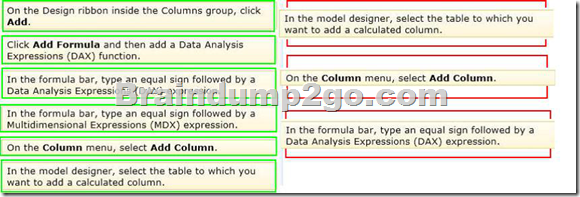New Released Braindump2go Microsoft 70-466 Dumps PDF – Questions and Answers Updated with Microsoft Official Exam Center! Visit Braindump2go and download our 70-466 Exam Questions Now, Pass 70-466 100% at your first time!
Vendor: Microsoft
Exam Code: 70-466
Exam Name: Implementing Data Models and Reports with Microsoft SQL Server 2014 Exam
QUESTION 141
You are managing a SQL Server Reporting Services (SSRS) instance.
A website must pass credentials to the local security authority for Reporting Services.
You need to configure Reporting Services to issue a challenge/response when a connection is made without credentials.
Which authentication type should you configure in the RSReportServer.config file?
A. RSWindowsKerberos and RSWindowsNegotiate
B. RSWindowsKerberos only
C. RSWindowsKerberos and RSWindowsNTLM
D. RSWindowsBasic
Answer: D
Explanation:
http://msdn.microsoft.com/en-us/library/ms157273.aspx
QUESTION 142
You are developing a BI Semantic Model (BISM) that retrieves data from several sources.
These sources include a SQL Azure database and an OData data feed that includes rainfall data for towns on the east coast of Australia. The model will be deployed to a server with significantly more memory than the total size of the source data.
You have the data feed URL, which you will use when developing the model in SQL Server Data Tools (SSDT).
The model must meet the following requirements:
– Performance must be maximized.
– Data latency of up to one month is acceptable.
You need to choose a project type and a data access mode to meet the requirements.
What should you do?
A. In SSDT, select the multidimensional project type and use the MOLAP storage mode.
B. In SSDT, select the multidimensional project type and use the ROLAP storage mode.
C. In SSDT, select the tabular project type and use the DirectQuery query mode.
D. In SSDT, select the tabular project type and use the In-Memory query mode.
Answer: D
QUESTION 143
You have a SQL Server 2012 database named DB1.
You have a backup device named Device1.
You discover that the log file for the database is full.
You need to ensure that DB1 can complete transactions.
The solution must not affect the chain of log sequence numbers (LSNs).
Which code segment should you execute?
A. BACKUP LCG DB1 TO Device1 WITH COPY_ONLY
B. BACKUP LOG DB1 TO Device1
C. BACKUP LOG DB1 TO Device1 WITH NCRECCVERY
D. BACKUP LOG D31 TO Device1 WITH TRUNCATE ONLY
Answer: B
QUESTION 144
You are troubleshooting query performance for a SQL Server Analysis Services (SSAS) cube.
A user reports that a Multidimensional Expressions (MDX) query is very slow.
You need to identify the MDX query statement in a trace by using SQL Server Profiler.
Which event class should you use?
A. Progress Report Begin
B. Query Begin
C. Execute MDX Script Begin
D. Calculate Non Empty Begin
E. Get Data From Aggregation
F. Query Subcube
Answer: B
QUESTION 145
Drag and Drop Questions
You are developing a SQL Server Analysis Services (SSAS) tabular project.
You need to add a calculated column to a table in the model.
Which three actions should you perform in sequence? (To answer, move the appropriate actions from the list of actions to the answer area and arrange them in the correct order.)
Answer:
Explanation:
– To create a new calculated column Add Column is highlighted over the empty rightmost column, and the cursor moves to the formula bar.
To create a new column between two existing columns, right-click an existing column, and then click Insert Column.
– Calculated columns, in tabular models, allow you to add new data to your model. Instead of pasting or importing values into the column, you create a DAX formula that defines the column’s row level values. The calculated column can then be used in a report, PivotTable, or PivotChart as would any other column.
– A calculated column is DAX expression that creates a new column in a table and the obtained values are stored in the table; the calculated column expression is evaluated every time the table is processed.
– In tabular object models the calculated column is a column in a table whose values are calculated upon definition of the column, from an expression.
Reference: Create a Calculated Column (SSAS Tabular)
QUESTION 146
You have an application that uses a view to access data from multiple tables.
You need to ensure that you can insert rows into the underlying tables by using the view.
What should you do?
A. Define the view by using the SCHEMABINDING option.
B. Define the view by using the CHECK option.
C. Create an INSTEAD OF trigger on the view.
D. Materialize the view.
Answer: C
QUESTION 147
You are creating a table named Orders.
You need to ensure that every time a new row is added to the Orders table, a user-defined function is called to validate the row before the row is added to the table.
What should you use? More than one answer choice may achieve the goal. Select the BEST answer.
A. a FOREIGN KEY constraint
B. a data manipulation language (DML) trigger
C. a DEFAULT constraint
D. a CHECK constraint
E. a Data Definition Language (DDL) trigger
Answer: D
QUESTION 148
You have a SQL Server 2012 instance that hosts a single-user database.
The database does not contain user-created stored procedures or user-created functions.
You need to minimize the amount of memory used for query plan caching.
Which advanced server option should you modify?
A. Enable Contained Databases
B. Allow Triggers to Fire Others
C. Optimize for Ad hoc Workloads
D. Scan for Startup Procs
Answer: C
QUESTION 149
You are administrating a SQL Server Analysis Services (SSAS) tabular database.
You need to create a new role that allows its members to query data and to refresh data in the model.
Which permission should you use? (More than one answer choice may achieve the goal. Select the BEST answer.)
A. Read and Process
B. Explore and Manage
C. Browse And Manage
D. Administrator
Answer: A
Explanation:
– Giving a database role permission to process an Analysis Services database means that the role has permission to perform all processing options on the database. This includes the processing of all cubes, dimensions, mining structures, and mining models in the database. However, the role does not have permission to read database metadata or access any data in the database itself.
QUESTION 150
You are developing a SQL Server Analysis Services (SSAS) tabular project.
In the data warehouse, a table named Employee Security defines a relationship between a salesperson’s name, logon ID, and assigned sales territory.
You need to ensure that each salesperson has access to data from only the sales territory assigned to that salesperson.
You also need to minimize the development effort.
What should you do? (More than one answer choice may achieve the goal. Select the BEST answer.)
A. Create a separate tabular project for each sales territory.
Grant each salesperson access to the corresponding tabular model of the assigned sales territory.
B. Create a new Active Directory Domain Services (AD DS) security group and add each salesperson as a member. Then create a new role with Read permission.
Add the group as a member to the new role.
C. Create a new role with Read permission and then add each salesperson’s logon as a
member to the role.
D. Add the Employee Security table to the model, define the relationships, and then implement dynamic security by using row filters. Grant each salesperson access to the model.
Answer: D
Braindump2go Regular Updates of Microsoft 70-466 Preparation Materials Exam Dumps, with Accurate Answers, Keeps the Members One Step Ahead in the Real 70-466 Exam. Field Experts with more than 10 Years Experience in Certification Field work with us.
![11022[2] 11022[2]](http://examgod.com/bdimages/e2ddd931eff0_F873/110222.png)


![1522[2] 1522[2]](http://examgod.com/bdimages/e2ddd931eff0_F873/15222.png)